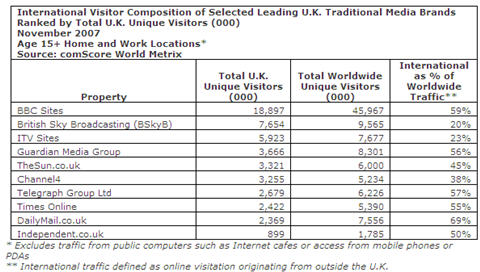comScore suggests Britain is the online home of truth

Guest post: Chris Matyszczyk explains why British media sites attract so much attention from non-native readers.
comScore, a company that has received permission from more than 2 million people to monitor their online behavior, has released findings that suggest when the world is looking for the truth, or at least an approximation, it logs on to British media sites.
This might seem odd to those who think the New York Times or, er, the National Enquirer, are the bastions of all the news that's fit to print. Or, at least, talk about.
Strangely, it is the Daily Mail, a newspaper of tabloid proportions that walks several very fine lines- those of right of center politics, old-fashioned civic pride, women's underwear and entertainment stories with a remarkably large number of words attached to them, that appears to have become one of the world's truly popular online 'news' destinations.
Almost 70 percent of the Mail's online readers are overseas. Many in the US, where the Mail (as well as the formerly stuffy Telegraph) has done a very skillful job ensuring that such apparently contradictory sites as the Drudge Report and the Huffington Post link to its more entertaining revelations.
Yes! Tony Blair has ANOTHER new job! For lots more money!
Startling too is the performance of the Guardian Media Group, a somewhat left of center newspaper that chooses, in its paper edition, to be published in the not-tabloid, not-broadsheet form called the Berliner.
Of course, the BBC has for many years given the impression of being willing to sacrifice their next of kin on the altar of objectivity. This is reflected in their more than 45 million unique visitors in November 2007.
However, these figures rather more reflect the desperate relationship that so many media brands have with trust. The BBC is a deeply unhappy organization that finds it far harder to achieve respect in its own country than abroad. Yet, when your competition on the world stage is CNN and Fox News, where else can those from countries where the media is merely another branch of government PR (and I am, of course, not referring to Italy here) go?
It is true that the UK has an extremely long tradition of literacy. (How else could they have owned America for so long?)
Yet, having been responsible for the creative work on several of the top British newspapers, I was a little surprised at just how much those publications relied for their sales on the excellence of their sports pages rather than that of their entertainingly supercilious political and editorial staff. (Although I suppose many these days view David Beckham as a political figure on the same level as the Dalai Lama. Or Angelina Jolie.)
It could very well be that a considerable amount of this international traffic merely reflects the world's insatiable fascination with the English Premier League (for anyone who's not familiar with the huge attraction of the British tax system to foreign sportsmen, that's soccer).
Still, American readers ought to be interested in the performance of the Sun, almost half of whose readers are international.
While American weekly tabloids such as the Enquirer, the Globe and the Star are suffocating at the gentle hands of irresistible online scandal peddlars such as TMZ.com and the ludicrously skillful Perezhilton.com, the Sun can still break the important stories that cause the world to cease breathing.
For example, the Sun recently revealed that Ashley Cole, a famously intelligent footballer heretofore known as Love Rat Ashley, had been repeatedly unfaithful to his wife, who just happens to be part of the cherished British all-girl group, Girls Aloud.
They followed that up with the news that Prince Philip, who is, apparently, still the Queen Elizabeth II's husband, asked Cate Blanchett, an actress who often plays Queen Elizabeth I, if she knew how to mend his DVD player. Well, she'd told him she works in the film industry.
So now can you appreciate why Madonna lives there?
